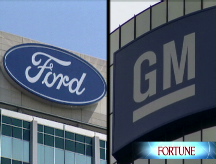Auto sales worst in 25 years
GM sales plunge 45% and sales for its U.S. and Asian rivals also tumble as industry records lowest sales pace since 1983.
NEW YORK (CNNMoney.com) -- Tight credit and worried consumers resulted in the weakest pace of U.S. auto sales in 25 years.
Although gas prices fell significantly during the course of the month, they weren't enough to lure buyers back to dealer showrooms.
Auto executives complained about the worst environment for sales since the severe recession in the early 1980's, if not longer.
Mark LaNeve, the General Motors vice president in charge of sales in North America, said that when adjusted for population growth, October represents the worst month for U.S. auto sales overall since the end of World War II.
According to preliminary figures from industry sales tracker Autodata, the seasonally-adjusted annual sales rate plunged to 10.6 million, the worst reading since February 1983.
By way of comparison, this figure was 16 million a year ago and 12.5 million in September this year.
"Unless you had to purchase a vehicle, it was wait and see for most consumers," said David Lucas, vice president of Autodata. "People are holding onto their money because they're unsure what the future holds."
But the CEO of auto industry sales tracker Edmunds.com said there is some hope that October may be as bad as it gets.
"The data suggests that the market hit bottom between Sept. 15 and Oct 15," said Edmunds.com CEO Jeremy Anwyl. "We can anticipate more fluctuations through the election and the holidays, but it is reasonable to assume that there is some degree of pent-up demand building."
General Motors (GM, Fortune 500) is reported the larger drops among major automakers. Its U.S. sales plunged 45% in the month, worse than the forecast of a 41% drop from Edmunds.com. Unlike some of its rivals, its sales even fell from what were weak levels in September.
"We are obviously disappointed in our results, which reflect a difficult comparison with a strong year-ago October performance," said LaNeve. "More importantly, it also reflects an unprecedented credit crunch that is dramatically impacting the entire U.S. economy," he added.
It was the lowest sales total at GM since December 1970, a month that followed a strike that shut production at the nation's largest automaker.
But double-digit declines in sales were the norm, not the exception, across the industry.
Ford (F, Fortune 500) sales were down 30% from a year earlier, including the company's Volvo unit in the sales total.
While that was a bit better than the 35% drop forecast by sales tracker Edmunds.com, it marked the 11th straight month that Ford's sales fell from year-earlier levels.
Sales were also up slightly from September, which was the weakest month for the company since January 1982.
Toyota Motor (TM), which is now the No. 2 automaker in terms of U.S. sales, posted a 23% decline from year-earlier levels. That was far worse than the 16% drop forecast by Edmunds.com. This was the tenth time in the past eleven months that its U.S. sales fell from a year ago.
The declining sales were felt across all categories of the industry.
Autodata reported that sales of light trucks, which include pickups, SUVs and vans, plunged 39% industrywide, while the sale of car models fell 24%. There were few major models from any automaker that posted a year-over-year sales gain.
Chrysler LLC, which includes the Chrysler, Dodge and Jeep brands, posted a 35% drop in sales and was one of the few automakers to report a drop in sales from September.
As bad as Chrysler's sales were, they were a bit better than the 38% decline forecast by Edmunds.com. The sales were also enough for Chrysler to hold off Honda Motor and remain the No. 4 automaker in terms of U.S. sales.
Honda Motor (HMC) and Nissan (NSANY) also posted sharp drops in sales from year-earlier levels: Honda sales fell 25% and sales at Nissan plunged 33%. Both were worse than Edmunds.com's forecasts.
Experts are worried that the weak sales and tight credit could cause the U.S. automakers to run out of cash as soon as 2009. While Ford has more cash on hand that its U.S. rivals, it is forecast to report a much larger third quarter loss than it did year ago when it releases results Friday.
Chrysler has reportedly held talks with GM as well as with the Nissan-Renault alliance about a possible merger with one of those automakers. But those talks are reportedly on hold. There has been talk that GM is seeking a loan from the Treasury Department in order to help finance a deal for Chrysler. ![]()


